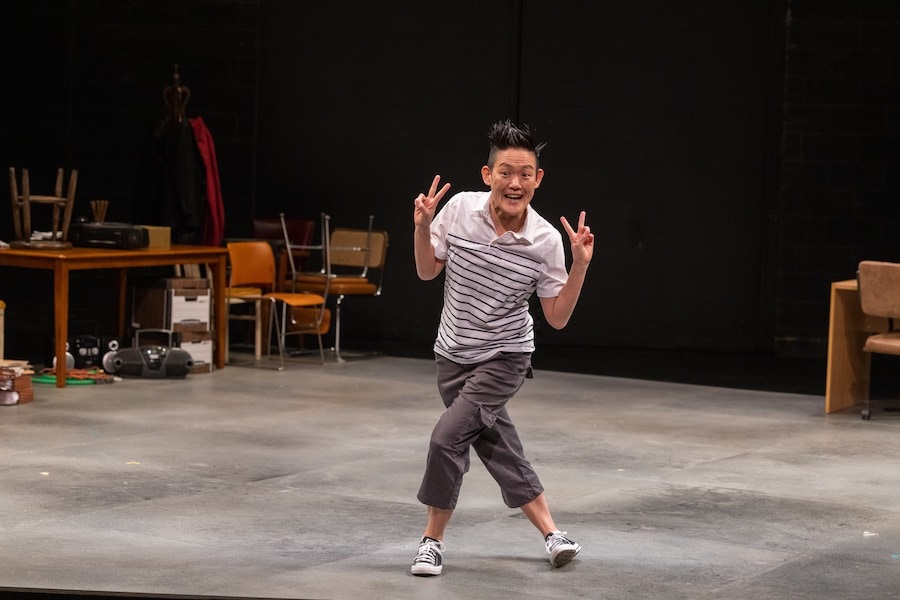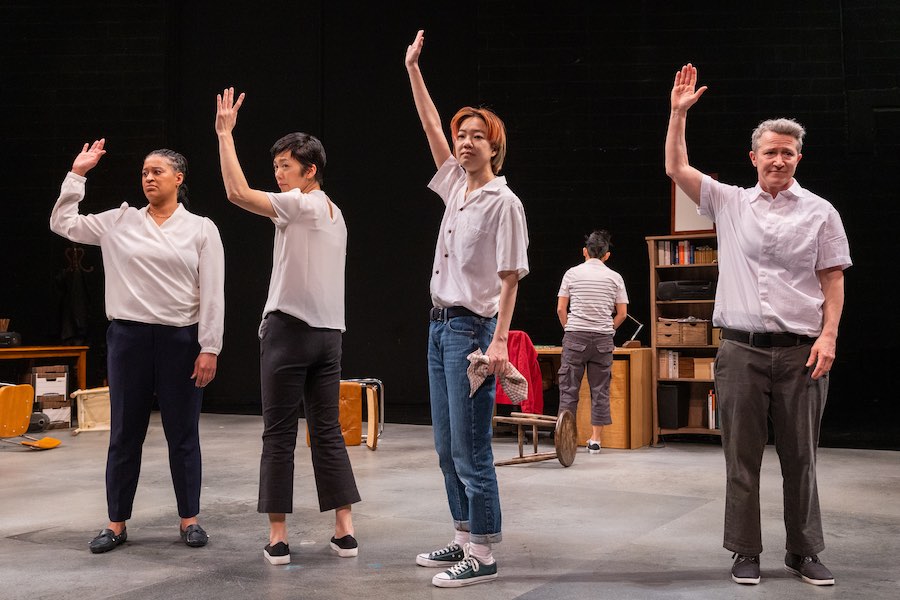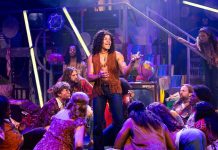The Nosebleed, written and directed by Aya Ogawa, is about the ways in which we fail — or believe we fail — our families and ourselves. Pointedly, in this production, unlike many productions you might attend, the “we” that is the subject of this exploration is not a generic, universal, or royal “we.” The production is structured so that each person in the audience gets the chance to identify, for themselves, moments in their own familial relationship about which there are questions that have not been addressed. Each person then gets to ask their question in the privacy that pencil and paper provide. One of the most touching moments in the production is how, without violating personal privacy or safety, these questions become a part of a ritual of grief during the evening.

The Nosebleed performance consists of both scripted theater and unscripted communal storytelling in which both onstage performers and audience members participate. It is clever, playful, tender, and poetic. And funny. It is exquisitely crafted in both performance and staging.
One day when Aya goes to her son’s room to find out why he is crying, she discovers that the child has a nosebleed. The son’s nosebleed starts Aya to thinking about her own competence as a parent, and it throws her into remembering her relationship with her own parents. The central story of the play is of Aya’s relationship with her parents and the unasked and unanswered questions around her parents’ relationship and her parents’ expectations. These family dynamics are compounded by the family’s relationship to the United States as Japanese immigrants and the dynamics involved in growing up as a non-white person in the United States.
The playwright uses a combination of techniques from psychodrama, playback theater, theater of the oppressed, as well as conventional theater, that give us as audience the permission to be aware of the very human baggage that, in an expertly managed way, we all carry, our baggage hidden in invisible knapsacks.
Along for this journey is a company of skilled and very versatile actors (Ashil Lee, Kaili Y. Turner, Saori Tsukada, Drae Campbell, Cody Nickell) who incisively embodies Aya and interact from time to time with the audience. Ogawa herself plays, in turn, her nosebleeding son and her own father, who is full of demands, hopes, expectations, and silence. Each actor interacts with the audience at various points to ask such questions as “Who here has a father?” Or to invite audience members to participate in a more active way.

The idea of the need for “story” and “narrative” are very popular these days in politics and community development. This is especially true in areas where hyper-gentrification threatens to wipe out the memory and evidence of people who have lived in a certain area for generations. It’s also pertinent as we fight over what the “real” America is. The need for shared stories or myths as we negotiate where our society is going next is palpable. The processes that Nosebleed employs to allow us, the audience, to acknowledge the stories that we are carrying around inside ourselves may be pointing in the direction of a paradigm shift in both the content and the process of telling stories that we can all share.
Running Time: 75 minutes with no intermission.
The Nosebleed plays through April 23, 2023, at Woolly Mammoth Theater Company, 641 D Street NW, Washington, DC. Tickets ($20–$70) may be purchased online, by phone at 202-393-3939 (Wednesday–Sunday, 12:00-6:00 p.m.), or in person at the Sales Office at 641 D Street NW, Washington, DC (Wednesday–Sunday, 12:00-6:00 p.m.).
The digital playbill for The Nosebleed is here.
COVID Safety: All audience and staff members are required to wear a mask inside the theater space. Masks are strongly recommended throughout the building.
The Nosebleed
Written and Directed By Aya Ogawa
CAST
Aya 0: Aya Ogawa
Aya 1: Ashil Lee
Aya 2: Kaili Y. Turner
Aya 3: Saori Tsukada
Aya 4: Drae Cambell
White Guy: Cody Nickell
Understudy (Aya 0-4): Manatsu Tanaka
CREW AND DESIGN ASSOCIATES
Set Designer & Costume Designer: Jian Jung
Lighting Designer: Jeanette Oi-Suk Yew
Sound Designer: Megumi Katayama
Stage Manager: Madolyn Friedman
Assistant Stage Manager: Jazzy Davis
COVID Safety Manager: Briana Padgett
Lighting Programmer: Scott Monnin
Light & Sound Operator: Jaimee Fricklaas
Production Sound Supervisor: Levi Manners
Wardrobe Crew: Thopmas Nagata
Crew Cover: Sarah Greenberg
Electricians: Jaimee Fricklasa, Milan Robinson, Angela Armstrong, Sydney Bronaugh
Associate Director/BOLD Rising Director: Nailah Unole didanas’ea Harper-Malveaux
Associate Lighting Designer: Christina Tang
Associate Sound Designer: Bryn Scharenberg




